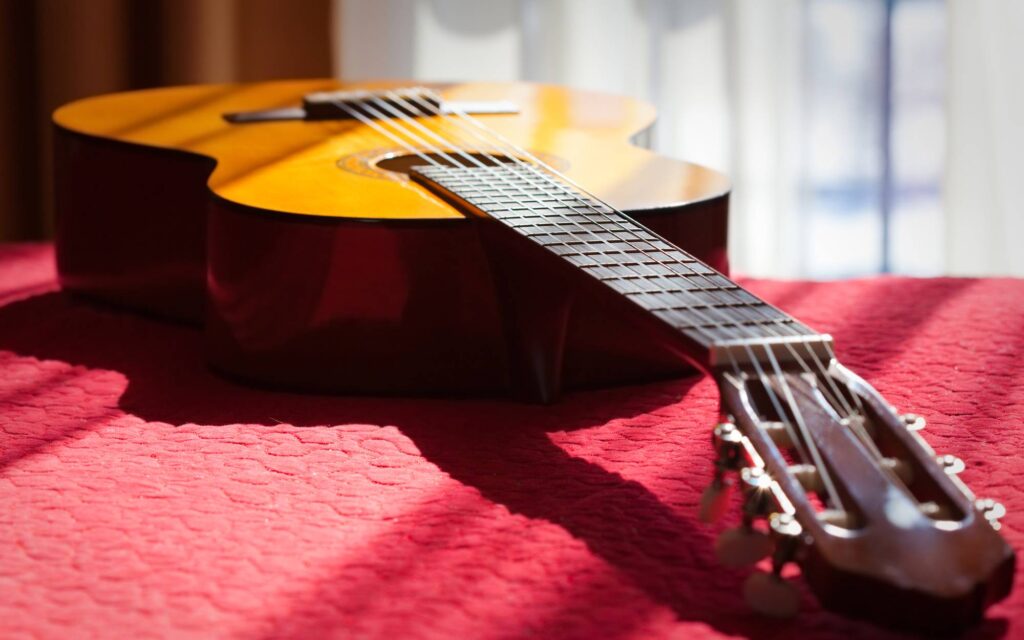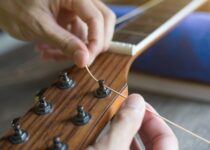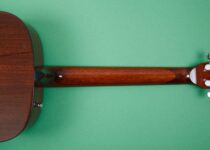If you’re wondering how long should you practice guitar a day – well, there isn’t one solid answer. Instead, it depends on various factors, like your goals and skill level.
However, you should see positive results with only 15 minutes of practice per day if you’re a beginner. If you’re more advanced, then you should practice anywhere between 30 to 90 minutes a day. Try to avoid long sessions at a time. Take small breaks every 20-30 minutes to get the best possible results.
Beginners should focus on building finger strength and stamina, so 2-hour sessions can be impossible for them. It’s not really about how long you practice but rather how well you practice learning guitar.
Read on to figure out how to make the most of your practice time.
Post Contents
How Often You Should Practice and Why

Starting to learn guitar can be quite an uncomfortable experience. Your fingers aren’t accustomed to the steel strings, especially the fifth and the sixth strings, which can even cut into your fingers while playing them for too long.
Your fingers also aren’t used to making the unusual shapes needed to play most of the chords yet.
It can take weeks till you start developing your guitar calluses and actually start enjoying the process of learning guitar. Through this initial period of learning the ropes and getting accustomed to your guitar, we suggest playing 15-30 minutes every day, depending on your preference.
Later on, you can increase this as you start getting into more music theory and have tougher hands.
Things to Know Before You Start
Here are a few things you should know before you start your journey to learn guitar.
Tune Your Guitar
An untuned guitar never sounds good. Make sure to tune your guitar every time you play it. Extended sessions or the guitar being stored away for a while can cause it to go out of tune. There is almost no point practicing on an out-of-tune guitar.
Use an app to do this at first, and later on, after a lot of practice, you will have enough ear training to do it on your own.
Use a Metronome
Using a metronome helps you develop control and rhythm over your playing as it enables you to lock in the rhythm of your songs. It allows you to stay on the beat, as we humans tend to speed up or fall behind.
Be Consistent
If you’re learning guitar (or any other complex skill), just remember that consistent practice is critical. Practicing just 10 minutes a day is still better than practicing an hour only on weekends. In other words, have consistent shorter sessions rather than inconsistent longer ones to speed up the guitar learning process.
Don’t Multitask
You need a lot of focus to learn the guitar. For efficient practice, make sure you’re in a place where you won’t be disturbed, and preferably where you can’t hear any external sounds.
Turn off the tv if it’s playing and put your phone on silent so your time practicing isn’t interrupted.
How Many Hours Should You Spend Playing Guitar in a Day?

Answering this questing isn’t easy as everyone is different, and picks up the guitar differently.
Practicing more than an hour a day will be very unproductive as humans tend to lose focus by that time. We don’t recommend doing that.
Studies have proven that there is little benefit from practicing more than 4 hours a day, and the gains usually start to decline significantly after the 2-hour mark.
It’s best to start small and work your way up. Take breaks in the middle of your guitar practice schedule. Start your guitar journey with a 10 to 15 minutes practice session a day but remember to be consistent.
If you’re busy and can’t spend all 7 days a week practicing due to work, family, or other hobbies, then it’s perfectly fine to just practice for 4 or 5 times a week.
Why Long Practice Sessions Are Bad
Guitar practice requires a lot of focus, and humans can only focus for a limited time before they get tired. Usually, our brains only remember the beginning and end of a practice session. For this reason, spaced repetition can be better than long, grueling sessions.
The thing to remember is that the longer the practice session is, the less effective per time committed it becomes. Adding 10 minutes to a 15-minute session is fine as the session is still short enough that all of the time will be effective.
In contrast, adding 10 minutes to 2 hours of practice is far less effective as you cannot get much out of adding them. Instead, if you really want to practice for a longer time, divide your sessions.
This means that if you’re doing 2-hour sessions per day, then maybe try having 1 hour in the morning and an additional hour in the afternoon instead.
This way, every time you pick up your guitar again, you will feel fresh and motivated and it will make a big difference.
Certain muscle groups in your hands and wrists can also be compromised by over-exertion for long periods. Elite athletes don’t start out there, and just like them, you need to improve your strength gradually and safely.
Exceptions to the Rule
If you do prefer one longer session while playing guitar, break your time down into smaller chunks.
You could learn songs for 15 minutes, then practice scales to improve your muscle memory for 15 minutes, then practice a new guitar technique you haven’t tried before, work on some bad habits, and repeat.
You could also stop playing completely just for 5-10 minutes at a time to let what you’ve learned sink in.
Imagine if you were with a guitar teacher, they wouldn’t just have you drilling something over and over for the hour you’re with them. They’d use their time to break things down into chunks.
Sometimes longer sessions can be good depending on exactly what you’re working on. For example, techniques that require hours upon hours of drilling to get right. But remember, it can still be good to intermittently stop practicing and come back to it later.
Why Deliberate Practice Time Is Better Than Mindless Repetition

Learning how to practice effectively is something that most beginner guitarists don’t really focus on. Now just learning your favorite songs and a dozen chord progressions can help you around a campfire but will it make your guitar skills sharp? Not likely.
So, what separates a focused practice routine from a mindless one? Most people choose to practice the painless way. It’s just to practice a piece for 30 minutes or repeat a tune 10 times. Plan your practice session out in advance and bring your best focus.
We can’t stress how much this impacts your guitar learning experience.
Here are a few problems with the mindless practice.
It Can Be a Waste of Time
Not only is a mindless practice session a waste of time, but it may also be bad for you. It’s because there isn’t any proper guidance, and you may end up strengthening bad habits and patterns, making you mess up more and more in the future.
Later on, it may be challenging for you to fix these mistakes as you have already strengthened the unwanted habits. Correcting these habits in the future may require a lot of time and effort, so it’s best to avoid this way of learning in the first place.
An exception to this could be playing songs on your acoustic guitar so you get used to not having to think while you play. It’s a good precursor to singing and playing at the same time.
You Won’t Be Consistent
Not having the techniques right means that you won’t be able to produce the same results consistently.
Not only does it hurt your confidence, but it also gives you that hint of doubt, meaning you’re constantly suffering from stage fright.
The only way to gain stage confidence is if you’re able to perfectly nail your piece every single time. You should be able to play it on demand and know your weaknesses and strengths.
Usually, when you play, it’s not a conscious mode, so if mid-playing, you do switch to a more conscious way of playing guitar, you may end up panicking and not play well.
It’s Boring and Feels Like a Chore
A mindless guitar-playing session is more of a chore than a fun activity.
You may have been told about the infamous 10,000-hour rule. To some extent, it is an excellent way of learning but what some people tend to forget is that 10,000 hours of bad practice is still worse than 100 hours of good training.
Instead, we need to focus our time and effort on specific goals rather than the ‘practice this passage 20 times’ method. This will help you produce the results you want when you want.
Deliberate Practice When You Play Guitar
This is a structured method of practice where instead of trial and error, you experiment with how you learn and set clear goals for what you want to learn and how you want to learn it. Often, focused practice is prolonged and involves the repetition of small sections rather than a portion of the song.
This also requires a lot of analysis as you monitor your progress in real-time by recording it and constantly looking for new ways to improve your work.
You have to listen to what you play and figure out what went wrong. For example, maybe a note was too loud or too soft, perhaps it was too sharp or flat.
Now let’s assume that one note was a little too sharp. So, what do we do now? Considering that note was just a bit too sharp, you’ve likely got your fingers one fret too high.
This cycle of playing and listening and correcting your errors is a significantly better way to spend practicing guitar than to just play and learn.
Most beginner guitarists do not take the time to stop and analyze, so they may face many problems in the long run.
How to Have a Successful Practice Session

You can’t become a great guitar player if you practice guitar but don’t have any skills to show for it. You need to have consistent progress to be a better guitarist.
Most beginners get stuck in a loop of watching a Youtube video and playing along to it. This is fine if you just want to learn a song to play for your friends, but this approach is detrimental to genuinely understanding the guitar.
Instead, what you should do is to know what you want to do. Plan out your sessions very carefully. This not only includes setting how long you want to practice guitar but also what time you want to practice and making notes to help you correct your mistakes and errors.
Assume that your main focus for a session is to learn a strumming pattern.
- Start by watching several guides on how to do it and the mistakes people make.
- Now try it yourself and record your playing so you can know where you’re going wrong.
- Lastly, try to fix the error so it doesn’t get embedded and negatively affect your playing.
Here are a few key things to know for more effective practice.
Duration of the Session
Limit your guitar playing sessions to a time where you can stay focused. There is no point in playing the guitar when you can’t even focus on learning. These can be short 10 or 20 minute sessions for beginners or younger students, while older or more skilled individuals can have 30 to 90 minutes of guitar lessons.
Timing of Your Practice
You should always practice at a time where you feel the most energized. Before you even pick up the guitar, track times of the day when you feel the most energetic. Some people may feel the most active in the morning, while some feel it in the afternoon.
Try to practice in these periods when you naturally feel productive as at these times you will be feeling fresh and focused.
Choosing The Material for When You Play Guitar
You know how many days and how much time out of those days you can dedicate to your daily practice.
Now, it’s beneficial to list out the material you wish to master.
If you commit 45 minutes to practice every day, you can choose to work on guitar theory, chord changes, or alternate picking techniques. Within these 45 minutes, divide them equally so you can touch upon every topic for the day.
Some tougher-to-learn material may need to be touched upon every day over a few days, weeks, months, or even years, so alternate your regular practice schedule to easily fit in the extra work.
Make sure to prioritize the more critical topics and leave the others for later.
By breaking up and dividing the material over a few days, you won’t get bored of the same thing while spending split time on each subject, which keeps it fresh and exciting.
Setting up Goals for When You Play Guitar
This is one of the most important things you should be doing. Make a habit of using a notebook to take notes of your lessons, track your progress, and write your goals.
You should have your goals laid out in steps. Jumping straight to barre chords before you learn basic chords won’t only just demotivate you, but it’s tough. The key here is the get into the zone where you have a clear intention on what you want to learn in this session.
This way, you know what type of sound you want to produce so you can start to produce it consistently. As soon as you figure something out or fix any of your errors, make sure to write it down.
As you practice guitar more, you will learn that writing everything down in a journal helps give purpose to your practice routine.
Practice Smart, Not Hard
Sometimes, you may notice that a particular note isn’t playing the way you want it to, which can happen for several reasons. What it means is that you need more practice and not just an unengaged practice session. Sometimes you may need to try a new strategy altogether or a different technique.
If you keep playing the same notes and repeating the same mistakes, then you’ll end up being frustrated and giving up. Instead, take a step back, analyze and brainstorm a different solution to your problem.
Guitar skill is not only the ability to play but also the ability to improvise, so keep trying new things till you land on something you’re able to work with efficiently.
Frequently Asked Questions
How Many Hours Should I Spend Practicing Guitar as a Beginner Daily?
It’s best to start slow if you’re a beginner. You don’t want to injure your fingers by pushing too hard on the strings as your calluses haven’t developed yet. We recommend starting with 15 minutes of practice every day.
It’s essential to follow a guide with clear goals if you’re studying on your own. What you learn may compound on itself, allowing you to grow at a faster rate.
Do I Need to Practice Guitar for Four Hours Every Day?
Most of us don’t have enough hours to put aside to learn to play the guitar. But being consistent with your practice is what’s essential. Taking your guitar lessons regularly and just practicing half an hour per day is more than enough to put you on the right track.
The pace at which you learn depends on how many quality hours you put in. So, 4 hours a day of smart practice for 6 months can get you to become an advanced guitar player, while just putting in 30 minutes per day for 6 months will probably have you at an intermediate level.
Is It Possible to Learn Much Quicker?
Yes, it’s possible. Daily practice with extreme focus allows you to be able to learn much faster. However, as we mentioned, you need consistent, focused practice, and you need to be present and engaged to make this happen.
Spending one day practicing then once again next week is not enough.
Why Is Learning the Guitar So Frustrating?
As a beginner, you expect quick results that you cannot get, as guitar learning takes a long time. When your abilities don’t match your expectation, you can start feeling frustrated.
You can easily overcome this by having structured learning and challenging yourself often by setting smaller more realistic goals for yourself.
Can Guitar Be Self-Taught?
Of course! In this new era of technology, you have thousands of videos and guides to learn the guitar. However, we still recommend learning the guitar from a teacher who can guide you properly and correct your mistakes so they don’t become embedded in your playing.
Is One Hour a Day of Practicing Guitar Enough?
One hour of practice is a great way to see rapid improvements in your playing abilities. However, as we recommended, it’s best to break up your sessions with a 10-minute break after every half an hour.
We recommend starting slow as learning the guitar is a long and arduous process for beginners, and you don’t want to overload your brain with information. We recommend starting with 10 to 20-minute sessions in the beginning.







